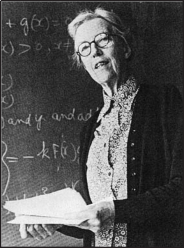- CARTWRIGHT
- UNITED KINGDOM (see also List of Individuals)\
 17.12.1900 Aynho/UK - 3.4.1998 Cambridge/UK\Mary Lucy Cartwright graduated in 1923 as a mathematician from Oxford University and there submitted a thesis in 1929. She was appointed an assistant lectureship in mathematics in Cambridge in 1934, and in 1936 became director of studies in mathematics at Girton College. Following works on modeling radio and radar during World War II, she was elected a Fellow of the Royal Society in 1947, the first woman mathematician. Cartwright was in 1948 appointed Mistress of Girton, in addition a Reader in the theory of functions in Cambridge in 1959, holding this appointment until 1968. After retiring, she found time for traveling to various institutions in the United States and Europe. She spent the academic year 1968-69 at Brown University - then Claremont Graduate College - with the University of Wales and Poland being visited in 1969 and 1970. She was the first woman to receive the Sylvester Medal and the first woman to serve on the Council of the Royal Society. Cartwright was president of the London Mathematical Society in 1961 and 1962. She received the De Morgan Medal of the Society in 1968. In 1969 she received the distinction of being honored by the Queen, becoming Dame Mary Cartwright, Commander of the British Empire.\Cartwright was a specialist in the theory of functions of the complex variable. In the 1940s, she worked in the mathematics of non-linear differential equations for the radar project. Her book Integral functions was published in 1956 and exceeded in depth and precision anything that had gone before. The book was heavily based on work that she had almost finished when the war began in 1939. In the 1970s, she presented three papers on boundedness theorems for second-order differential equations as occur in hydrodynamics. Cartwright obtained immense satisfaction from doing mathematics. She believed that a number of major developments in pure mathematics were first thought out in terms of real-world situations. When asked what her favorite paper was, she gave the ultimate mathematician's reply: “… the one I am working on at the moment.”\Anonymous (1959). Mathematician and mistress of Girton. New Scientist 8(53): 754-755. P Cartwright, M.L. (1955). The mathematical mind. Oxford University Press: London. Cartwright, M.L. (1956). Integral functions. University Press: Cambridge.McMurran, S., Tattersall, J. (1999). Mary Cartwright. Notices of the American Mathematical Society 46(2): 214-220. P http://www-groups.dcs.st-and.ac.uk/%7Ehistory/Mathematicians/Cartwright.html http://www-groups.dcs.st-and.ac.uk/CARTWRIGHThistory/Mathematicians/Cartwright.html P
17.12.1900 Aynho/UK - 3.4.1998 Cambridge/UK\Mary Lucy Cartwright graduated in 1923 as a mathematician from Oxford University and there submitted a thesis in 1929. She was appointed an assistant lectureship in mathematics in Cambridge in 1934, and in 1936 became director of studies in mathematics at Girton College. Following works on modeling radio and radar during World War II, she was elected a Fellow of the Royal Society in 1947, the first woman mathematician. Cartwright was in 1948 appointed Mistress of Girton, in addition a Reader in the theory of functions in Cambridge in 1959, holding this appointment until 1968. After retiring, she found time for traveling to various institutions in the United States and Europe. She spent the academic year 1968-69 at Brown University - then Claremont Graduate College - with the University of Wales and Poland being visited in 1969 and 1970. She was the first woman to receive the Sylvester Medal and the first woman to serve on the Council of the Royal Society. Cartwright was president of the London Mathematical Society in 1961 and 1962. She received the De Morgan Medal of the Society in 1968. In 1969 she received the distinction of being honored by the Queen, becoming Dame Mary Cartwright, Commander of the British Empire.\Cartwright was a specialist in the theory of functions of the complex variable. In the 1940s, she worked in the mathematics of non-linear differential equations for the radar project. Her book Integral functions was published in 1956 and exceeded in depth and precision anything that had gone before. The book was heavily based on work that she had almost finished when the war began in 1939. In the 1970s, she presented three papers on boundedness theorems for second-order differential equations as occur in hydrodynamics. Cartwright obtained immense satisfaction from doing mathematics. She believed that a number of major developments in pure mathematics were first thought out in terms of real-world situations. When asked what her favorite paper was, she gave the ultimate mathematician's reply: “… the one I am working on at the moment.”\Anonymous (1959). Mathematician and mistress of Girton. New Scientist 8(53): 754-755. P Cartwright, M.L. (1955). The mathematical mind. Oxford University Press: London. Cartwright, M.L. (1956). Integral functions. University Press: Cambridge.McMurran, S., Tattersall, J. (1999). Mary Cartwright. Notices of the American Mathematical Society 46(2): 214-220. P http://www-groups.dcs.st-and.ac.uk/%7Ehistory/Mathematicians/Cartwright.html http://www-groups.dcs.st-and.ac.uk/CARTWRIGHThistory/Mathematicians/Cartwright.html P
Hydraulicians in Europe 1800-2000 . 2013.
